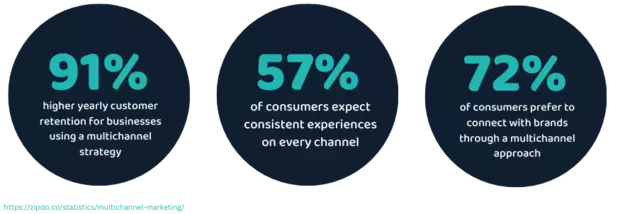Maximising revenue through multi-channel marketing

It goes without saying that digital technology has transformed the way retailers operate. In fact, it has sparked a whole new industry – ecommerce. While ecommerce tends to be most commonly associated with the consumer world, it’s been gaining traction among B2B suppliers too, in the building trade and among wholesalers, for example. Whether a retailer operates physical stores, or is purely digital, the number of sales channels customers can choose has grown quickly.
Operating multiple sales channels – such as a website, store, app, social media and marketplaces – is an opportunity to reach a wider audience, drive revenue and increase brand awareness. To ensure each of these channels deliver revenue and a strong return-on-investment, you need a multi-channel marketing strategy in place.

Maximise impact. Maximise profits.
Multi-channel marketing is all about meeting your audience where they are, whether it's in physical stores, on websites, or through social media. By engaging with customers on multiple fronts, you increase your brand's exposure and make it more likely that potential buyers will come across your products or services.
If done effectively, multichannel marketing can put businesses in direct contact with customers on their channel of choice leading to increased sales and loyalty. In fact, 72% of consumers prefer to connect with businesses through a multichannel approach and businesses using this strategy see a 89% retention rate on average.
Benefits of multi-channel marketing
- Wider audience reach: Multi-channel marketing allows you to tap into different demographics and engage with consumers who prefer different communication channels.
- Increased brand visibility: Consistency across all channels reinforces your brand's identity and makes it more memorable to customers.
- Higher conversion rates: When customers see your brand across multiple touchpoints, they are more likely to make a purchase.
- Diversified revenue streams: Different channels can cater to different customer needs and preferences, helping to mitigate risks.
- Data insights: The data collected from various channels can provide valuable insights for refining your marketing strategies.
Integration is key
The real power of multi-channel marketing lies in how effectively you can integrate these channels. Here’s just a few ways in which businesses can leverage this integration:
- Seamless customer experience: Consistency is key when it comes to multi-channel marketing. Your customers should experience a unified and consistent message whether they interact with your brand in-store, on your website, through social media, or via email. This consistent brand experience fosters trust and loyalty.
- Data integration: Integrating your data from various channels allows you to understand your customers better. With insights into customer behaviour, preferences, and purchase history, you can tailor your marketing efforts more effectively.
- Unified stock management: For retail businesses, managing inventory across multiple channels can be challenging. An integrated system ensures that you have accurate stock information and can fulfill orders promptly, whether they come from your physical store or your e-commerce site.
- Automated marketing campaigns: Automation tools enable you to streamline marketing efforts. You can send targeted messages or promotions to customers based on their interactions across different channels.
The role of ERP
To achieve seamless integration and fully realise the potential of multi-channel marketing, many businesses turn to Enterprise Resource Planning (ERP) systems. This technology serves as a central hub for managing various business processes, including inventory, sales, and customer data.
For retailer The Wright Buy, the adoption of Orderwise played a pivotal role in their transformation. The system facilitated the seamless integration of business processes and provided the capability to connect with major online marketplaces like eBay and Amazon.
By centralising their core processes and automating essential tasks, The Wright Buy was able to:
- Speed up courier booking by 90%
- Save £20,000 each year on labour costs
- Increase turnover by 242%

The way forward
To succeed in today's business landscape, it's essential to maximise revenue through multi-channel marketing strategies. Effective integration of online and offline channels, as exemplified by The Wright Buy, not only broadens your reach and increases brand visibility but also empowers your business to thrive in an increasingly digitalized world.
Whether you're a small startup or an established enterprise, consider the lessons from The Wright Buy's success and explore how an ERP system can elevate your multi-channel marketing game. By creating a seamless and integrated customer experience, you can drive sales and establish a strong, memorable brand presence across all your channels.